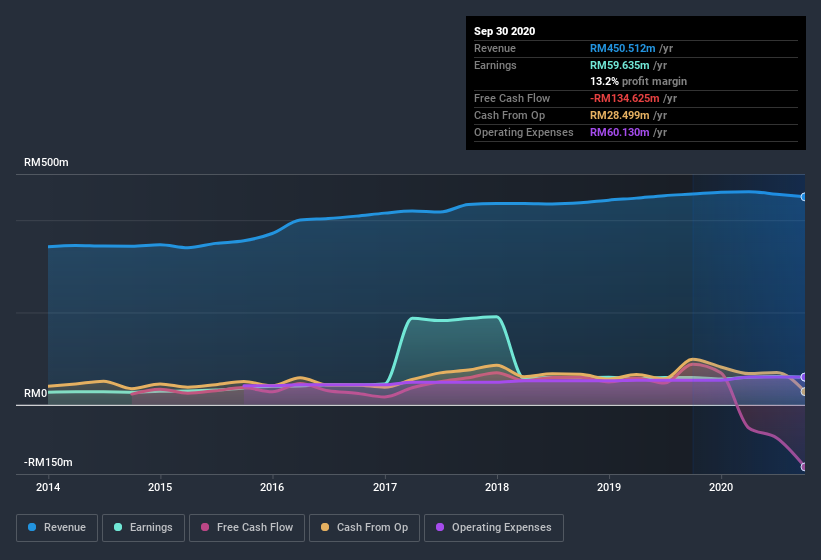We're Not Counting On Ajinomoto (Malaysia) Berhad (KLSE:AJI) To Sustain Its Statutory Profitability
As a general rule, we think profitable companies are less risky than companies that lose money. However, sometimes companies receive a one-off boost (or reduction) to their profit, and it's not always clear whether statutory profits are a good guide, going forward. Today we'll focus on whether this year's statutory profits are a good guide to understanding Ajinomoto (Malaysia) Berhad (KLSE:AJI).
While Ajinomoto (Malaysia) Berhad was able to generate revenue of RM450.5m in the last twelve months, we think its profit result of RM59.6m was more important. As you can see in the chart below, its profit has declined over the last three years, even though its revenue has increased.
View our latest analysis for Ajinomoto (Malaysia) Berhad

Importantly, statutory profits are not always the best tool for understanding a company's true earnings power, so it's well worth examining profits in a little more detail. Today, we'll discuss Ajinomoto (Malaysia) Berhad's free cashflow relative to its earnings, and consider what that tells us about the company. That might leave you wondering what analysts are forecasting in terms of future profitability. Luckily, you can click here to see an interactive graph depicting future profitability, based on their estimates.
Examining Cashflow Against Ajinomoto (Malaysia) Berhad's Earnings
As finance nerds would already know, the accrual ratio from cashflow is a key measure for assessing how well a company's free cash flow (FCF) matches its profit. To get the accrual ratio we first subtract FCF from profit for a period, and then divide that number by the average operating assets for the period. The ratio shows us how much a company's profit exceeds its FCF.
Therefore, it's actually considered a good thing when a company has a negative accrual ratio, but a bad thing if its accrual ratio is positive. While it's not a problem to have a positive accrual ratio, indicating a certain level of non-cash profits, a high accrual ratio is arguably a bad thing, because it indicates paper profits are not matched by cash flow. That's because some academic studies have suggested that high accruals ratios tend to lead to lower profit or less profit growth.
For the year to September 2020, Ajinomoto (Malaysia) Berhad had an accrual ratio of 0.80. As a general rule, that bodes poorly for future profitability. To wit, the company did not generate one whit of free cashflow in that time. Over the last year it actually had negative free cash flow of RM135m, in contrast to the aforementioned profit of RM59.6m. We saw that FCF was RM88m a year ago though, so Ajinomoto (Malaysia) Berhad has at least been able to generate positive FCF in the past. One positive for Ajinomoto (Malaysia) Berhad shareholders is that it's accrual ratio was significantly better last year, providing reason to believe that it may return to stronger cash conversion in the future. As a result, some shareholders may be looking for stronger cash conversion in the current year.
Our Take On Ajinomoto (Malaysia) Berhad's Profit Performance
As we have made quite clear, we're a bit worried that Ajinomoto (Malaysia) Berhad didn't back up the last year's profit with free cashflow. For this reason, we think that Ajinomoto (Malaysia) Berhad's statutory profits may be a bad guide to its underlying earnings power, and might give investors an overly positive impression of the company. And we are pleased to note that EPS is at least heading in the right direction in the alst twelve months. The goal of this article has been to assess how well we can rely on the statutory earnings to reflect the company's potential, but there is plenty more to consider. So while earnings quality is important, it's equally important to consider the risks facing Ajinomoto (Malaysia) Berhad at this point in time. Every company has risks, and we've spotted 1 warning sign for Ajinomoto (Malaysia) Berhad you should know about.
Today we've zoomed in on a single data point to better understand the nature of Ajinomoto (Malaysia) Berhad's profit. But there are plenty of other ways to inform your opinion of a company. For example, many people consider a high return on equity as an indication of favorable business economics, while others like to 'follow the money' and search out stocks that insiders are buying. So you may wish to see this free collection of companies boasting high return on equity, or this list of stocks that insiders are buying.
When trading Ajinomoto (Malaysia) Berhad or any other investment, use the platform considered by many to be the Professional's Gateway to the Worlds Market, Interactive Brokers. You get the lowest-cost* trading on stocks, options, futures, forex, bonds and funds worldwide from a single integrated account. Promoted
New: Manage All Your Stock Portfolios in One Place
We've created the ultimate portfolio companion for stock investors, and it's free.
• Connect an unlimited number of Portfolios and see your total in one currency
• Be alerted to new Warning Signs or Risks via email or mobile
• Track the Fair Value of your stocks
This article by Simply Wall St is general in nature. It does not constitute a recommendation to buy or sell any stock, and does not take account of your objectives, or your financial situation. We aim to bring you long-term focused analysis driven by fundamental data. Note that our analysis may not factor in the latest price-sensitive company announcements or qualitative material. Simply Wall St has no position in any stocks mentioned.
*Interactive Brokers Rated Lowest Cost Broker by StockBrokers.com Annual Online Review 2020
Have feedback on this article? Concerned about the content? Get in touch with us directly. Alternatively, email editorial-team@simplywallst.com.
About KLSE:AJI
Ajinomoto (Malaysia) Berhad
Manufactures and sells monosodium glutamate and other related products in Malaysia.
Flawless balance sheet second-rate dividend payer.
Similar Companies
Market Insights
Community Narratives




